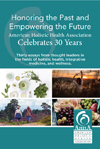American Holistic Health Association
The free, impartial wellness resource connecting you to the power of choice

Special Updates
Archives 2019
Free AHHA monthly Reports
The monthly Special Updates from the AHHA are Reports with items of interest to those actively enhancing their health and well-being. Each Report features a health or health freedom issue. It also features a research item and an AHHA resource.
These free Reports are sent out to subscribers.
You can have these AHHA Special Updates sent to you personally by signing up online.
The Archives of these AHHA Special Reports are maintained here for those who have not yet signed up to receive them by email and those who wish to review past issues.
December 20, 2019
FEATURED RESEARCH
Are you absorbing toxins through your skin?
“When assessing the entirety of the exposome that affects human health, it is important to consider the invisible sea of synthetic chemicals being applied to our patients’ bodies every day.” from a Townsend Letter research article, “The Skin as Exposome: An Underappreciated Route of Entry for Toxicants” by Anne Marie Fine, NMD.
FEATURED ISSUE
FDA now handling homeopathic remedies as drugs
Homeopathy is a 200-year-old system of medicine based on the principle that highly diluted substances can be used to treat symptoms similar to symptoms that would be caused by larger doses of those same substances in healthy people. Practitioners of homeopathy explain that it works because the “substance” becomes so diluted that only its energy is left. For this reason, homeopathy has generally been viewed for centuries as one of the safest treatment options available. Some note, however, that it is important that patients requiring more aggressive and time-sensitive therapies should not be dissuaded from considering other therapies.
AHHA first alerted you in 2015 to the U.S. Food and Drug Administration’s (FDA’s) reevaluation of the homeopathic industry. This issue has now progressed to the FDA’s considering the potential risk of homeopathic remedies and requiring pharmaceutical drug-safety testing requirements.
On October 25, 2019, the FDA published a revised draft guidance titled “Drug Products Labeled as Homeopathic” and asked for public comments. This document, like the original 2017 version, prioritizes enforcement and regulatory action of homeopathic biological products that potentially pose higher risk to public health marketed in the United States without the required FDA approval. Further,homeopathic medicines are designated “new drugs” because they have not undergone the FDA’s required pre-market testing. Note that the comments period for this document ends on January 23, 2020.
Additionally, as of October 25, 2019, the FDA withdrew their 1988 compliance policy guide (CPG) titled “Conditions Under Which Homeopathic Drugs May be Marketed.” This documenthad linked compliance to homeopathic industry standards rather than FDA approval. Therefore, according to the FDA, homeopathic remedies are drugs that are being marketed illegally andare subject to FDA enforcement action, perhaps as soon as a few months after the draft guidance comments period ends in January.
There appear to be three groups taking positions on this issue. (1) One group supports the FDA viewpoint that homeopathic remedies are an untested danger and should be handled as drugs. (2) A second group disputes the possibility of patient and consumer risk and points to a long history of homeopathic safety, citing that the costs of pre-market compliance required for testing to meet FDA requirements are unrecoverable and burdensome for non-patentable homeopathic remedies, which likely prices them out of the U.S. marketplace. The third group feels they have compromise revisions to the 2019 draft guidance version that would allow for the continuance of the homeopathic industry in the U.S. This latter group feels more time is needed for these proposed compromises to be considered and is campaigning to extend the comments period beyond the current January 23, 2020, deadline.
ISSUE: How to handle homeopathic product safety in the U.S.?
AHHA strives to maintain a neutral position on issues and viewsknowledge as power. For those interested in this month’s issue and learning more about this topic the articles below were selected to offer you some resources to begin your research.
PRO FDA approach
Statement on the agency’s efforts to protect patients from potentially harmful drugs sold as homeopathic products (10/24/19)
U.S. Food and Drug Administration
Drug Products Labeled as Homeopathic; Draft Guidance for Food and Drug Administration Staff and Industry (10/25/19)
Federal Register
[posted 10/25/19; comments due by 1/23/20]
The Food and Drug Administration (FDA or Agency) is announcing the withdrawal of Compliance Policy Guide Sec. 400.400 (CPG 400.400) entitled “Conditions Under Which Homeopathic Drugs May be Marketed,” which was issued in 1988. (10/25/19)
Federal Register
FDA to Prioritize Enforcement Actions Against Unapproved Homeopathic Drugs (11/27/19)
JD Supra
AGAINST THE FDA approach
Access to Homeopathy Threatened by Latest FDA Action
American Institute of Homeopathy
Tell the FDA That We Will Not Tolerate the Abolition of Homeopathic Medicine in America!
National Health Federation
FDA Renews Attack on Homeopathy (11/21/19)
Alliance for Natural Health USA
Homeopathy Remains at Risk
Americans for Homeopathy Choice
FEATURED AHHA RESOURCE
30th Anniversary Celebration
AHHA just turned 30! We are celebrating this important milestone with the publication of a one of a kind eBook entitled, Honoring the Past and Empowering the Future: American Holistic Health Association Celebrates 30 Years.
This special eBook consists of inspiring essays from thirty thought leaders in the fields of holistic health, integrative medicine, and wellness. The eBook also contains the story of the unique series of events and the moment of inspiration that that led directly to the creation of AHHA.
To celebrate our 30th anniversary we are honored to provide this eBook to you as a gift in exchange for a minimum charitable donation to AHHA of only $30.
Click here for more exciting details
November 22, 2019
FEATURED RESEARCH
Healthy sleep is under attack
“What Does Sleep Loss Do to Us?…Why You Can’t Sleep…Natural Ways to Help You Sleep…Too Much Sleep Isn’t Better…Sleep-Boosting Lifestyle” are a few of the sections in a Townsend Letter research article, “New Whys and Ways to Sleep Better, Especially After 40” by Devaki Lindsey Berkson, DC.
FEATURED ISSUE
Possible threat to compounded bioidentical hormones?
Bioidentical hormones have been nominated to be addedto the Food and Drug Administration’s Demonstrably Difficult to Compound List. When something is officially addedto this FDA list, that item will no longer be allowed to be made at compounding pharmacies. Note that there are synthetic and natural hormone product options. Both have been approved as safe and effective by the FDA. However, many individuals are not able to assimilate synthetic hormones and need a customized dosage level of the natural bioidentical hormone option. And this latter is only available through a compounding pharmacy.
The issue appears to be that because the FDA has not tested and approved the customized compoundedforms, there must be the possibility that they are not safe or effective. The fate of compounded bioidentical hormones appears to have been turned over by the FDA to the Clinical Utility of Treating Patients with Compounded “Bioidentical Hormone Replacement Therapy”study committee of the National Academies of Science, Engineering, and Medicine. This month is the sixth meeting in a series that has taken place throughout 2019. Reviewing the actions taken so far by this committee has raised some concerns about a possible preexisting bias among committee members towards supporting the position that compounded bioidentical hormones are neither safe nor effective.
This matter might not be so serious, if there were an alternative for those who cannot assimilate the synthetic hormones and require a controlled compounded dosage level of the natural bioidentical hormone option. What will these individuals (mostly women) do if their only source is banned?
ISSUE: Safety and effectiveness of compounded bioidentical hormones
AHHA strives to maintain a neutral position on issues and viewsknowledge as power. For those interested in this month’s issue and learning more about this topic the articles below were selected to offer you some resources to begin your research.
PRO
The Benefits of Compounded Hormones Can Enhance Menopause and Andropause Treatment (8/13/19)
BodyLogicMD
FDA Rigs Process Against Estriol, Other Bioidenticals (11/7/19)
Alliance for Natural Health
Uses and Benefits of Compounded Progesterone (4/26/19)
Harbor Compounding Pharmacy
CON
Compounded Bioidentical Hormone Therapy (10/2/19)
Endocrine Society
HRT Has an Uncertainty Problem. Does Compounding Make It Worse? (2/13/19)
Managed Care
Bioidentical Hormones
Cleveland Clinic
FEATURED AHHA RESOURCE
Holiday gifts can include health tips
Are you looking for a special holiday gift to motivate a loved one to get more involved in his/her quality of wellness? AHHA members have written books and created CDs and DVDs that are filled with tips for improving our health.You can learn more at Health-related Books, CDs, DVDs…and the Books/ Other Media sectionof the AHHA Organizational Member list.
October 18, 2019
FEATURED RESEARCH
Fibromyalgia pain relief
“Fibromyalgia is dramatically increasing in both prevalence and public awareness.” Learn about “a comprehensive protocol to see optimal results…from severe fatigue and widespread pain” in a Townsend Letter research article, “Effective Treatment of Pain and Sleep in Fibromyalgia: A Comprehensive Clinical Approach” by Jacob Teitelbaum, MD.
FEATURED ISSUE
Possible threat to organic standards?
GMOs (genetically modified organisms) areplants, animals, or other organismswhose genetic material is altered in a way that does not occur naturally. This genetic engineering is the basis for the current label for GMO foods, such as strawberries with a genetically introduced anti-freezing genefrom Arctic flounder to extend their growing season in northern climates. For those who are concerned about eating foods altered with foreign genetic material, it is important to maintain strict standards regarding labeling of foods as “organic” or “GMO” (recently legally changed to be “genetic engineered”). However, in July 2019 the U.S. Department of Agriculture heard arguments at a House Agriculture Subcommittee hearing to allow gene editing to be considered a part of organic production. Those supporting the purity of organic foods are closely following the discussions to ensure that the techniques for gene modification (including CRISPR, Genetic Engineering, Mutation Breeding) do not become confounded with the issue of whether or not added genetic material is foreign. Is it a distraction to the GMO/organic food issue when arguments favoring organic genetic engineering use examples of selective breeding techniques without foreign genetic material, but do not identify that these techniques could also be used to introduce foreign DNA?
ISSUE: Genetic modification and manipulation of organic products
AHHA strives to maintain a neutral position on issues and viewsknowledge as power. For those interested in this month’s issue and learning more about this topic the articles below were selected to offer you some resources to begin your research.
PRO
Organic farming with gene editing: An oxymoron or a tool for sustainable agriculture? {5/14/19) [originally published 10/10/18 by The Conversation]
by Rebecca Mackelbrang
Cornell Alliance for Science
Viewpoint: Organic food movement ‘shoots itself in the foot’ by rejecting CRISPR gene editing (8/20/19)
by Steven Cerier
Genetic Literacy Project
Are You Scared of GMO Foods? (7/31/199)
by Jonathon McPhetres
Scientific American
CON
Gene Editing and Organic Certification (9/8/19)
NODPA
Gene Editing is Prohibited in Organic (10/1/19)
National Organic Coalition
What Are GMOs and GM Foods? (7/8/19)
by Marc Lallanilla
LiveScience
FEATURED AHHA RESOURCE
Discover new wellness options
AHHA Organizational Member companies offer you innovative wellness-enhancing products and services to support your journey to a higher level of wellness. In our online Resource section, check out the PRODUCTS and SERVICES categories of the AHHA Self-Help Tools searchable database.
September 20, 2019
FEATURED RESEARCH
Deep healing
Consider a recommendation for patients to look for “an irreconcilable conflict that is the underlying basis of their disease.” That they can consider it a positive opportunity that “every one of us has a karmic knot … lurking under the surface of our lives, waiting for the disease that will launch us into discovery.” in a Townsend Letter research article, “To Know Thyself: The Discovery Process” by Robert Kellum, ND, PhD, LAc, LMT.
FEATURED RESEARCH
Deep healing
Consider a recommendation for patients to look for “an irreconcilable conflict that is the underlying basis of their disease.” That they can consider it a positive opportunity that “every one of us has a karmic knot … lurking under the surface of our lives, waiting for the disease that will launch us into discovery.” in a Townsend Letter research article, “To Know Thyself: The Discovery Process” by Robert Kellum, ND, PhD, LAc, LMT.
FEATURED ISSUE
Flu season approaching
It’s that time of year again. We can expect the annual push to get your flu shot. The pro- and anti-vaccine camps do not seem to have changed their positions. Those in the pro camp point out that the side effects of a flu shot are better than having the flu, whereas those on the con side insist that there is a lack of scientific research that validates the vaccine’s effectiveness. Both sides point out that flu shots are not for infants six months and younger, those with Guillain-Barré syndrome, and anyone with an allergy to eggs, gelatin, antibiotics, or other ingredients in the vaccine.
No matter which camp you favor, why not take common-sense preventive actions? Build up your immune system with a healthy diet including lots of vitamin D and C and stay hydrated. Get an adequate amount of sleep at night, be sure to exercise, and reduce your stress level.
ISSUE: Annual flu shots
AHHA strives to maintain a neutral position on issues and viewsknowledge as power. For those interested in this month’s issue and learning more about this topic the articles below were selected to indicate that there are opposing viewpoints and offer you some resources to begin your research.
PRO
Frequently Asked Flu Questions: 2019-2020 Influenza Season
Centers for disease Control and Prevention
Experts Say Get Your Flu Shot Early: Here’s Why (9/2/19)
Healthline
This year’s flu season may be a bad one. Here’s why you need a flu shot. (9/17/19)
by Erika Edwards
NBC News
CON
10 Reasons Why Flu Shots Are More Dangerous Than a Flu!
BeWellBuzz
Why You Should Not Get the Flu Shot (8/1/18)
Dr. David Williams
Why Smart Doctors Don’t Get Flu Shots (10/27/17)
by Dr. Cammy Benton
The Thinking Moms’ Revolution
FEATURED AHHA RESOURCE
Do you have any treatment questions?
Perhaps the most important resource ever created by AHHA is the Treatment Researchers list. This unique list includes organizations whose experts can answer your health questions and research treatment options for any health condition using conventional medicine and/or alternative approaches. If you know of someone dealing with a life threatening or debilitating diagnosis, it is vital for you to inform him or her of this valuable support option.
August 16, 2019
FEATURED RESEARCH
Underlying allergy causes
“Allergies can be treated effectively by addressing the whole person and their individual underlying conditions.” Learn to consider nutrition, diamine oxidase, nasal sinus relief, treating the gut, parasitic infection, and allergy tolerance in a Townsend Letter research article, “The Whole-Body Approach to Treating Allergies” by Clement Lee, NMD.
FEATURED ISSUE
Rise of superbugs
Are you confident that an antibiotic will kill off your bacterial infection? Perhaps you are aware that there is a rise in the number of superbugs––bacteria, fungi, parasites, and even viruses–that are resistant to most of the antibiotics commonly used today.These drug-resistant bacteria can cause conditions such as pneumonia, urinary tract infections, and skin infections. Instead of relying on treatments that may not be effective, consider an active prevention strategy. Strive to develop healthy lifestyle habits, including eating a healthy diet, getting enough exercise, and establishing good sleeping patterns, all of which have been shown to promote a strong immune system. Healthy hygiene habits, including washing your hands with soap and warm water when you have been in public places and especially in hospitals and other locations where sick people are being treated, can reduce or prevent your exposure to harmful bacteria. Take antibiotics only when they are really needed and always be mindful that you should complete the full treatment course as prescribed by your doctor.
ISSUE: How strong is the threat from superbugs?
AHHA strives to maintain a neutral position on issues and viewsknowledge as power. For those interested in this month’s issue, the articles below were selected for learning more about the current status of superbugs and developing tools for dealing with them.
What are superbugs and how can I protect myself from infection?
from James M Steckelberg, MD
Mayo Clinic
Antibiotic resistance is a naturally occurring phenomenon that can be slowed, but not stopped.
‘Superbugs’ found on many hospital patients’ hands and what they touch most often (4/14/19)
ScienceDaily
For decades, hospitals have worked to get staff to wash their hands and prevent the spread of germs. But a new study suggests they may want to expand those efforts to their patients, too.
What are superbugs? Doctor sounds alarm about spread of antibiotic-resistant bacteria (7/29/19)
by A. Pawlowski
Today
There are more superbugs, fewer treatment options and fewer doctors who know how to treat them, an expert warns.
Can scientists learn to bypass superbugs’ drug resistance? (6/17/19)
by Maria Colhut
MedicalNewsToday
When bacteria become resistant to antibiotic treatments, this poses an important threat to health, as infections become very difficult — and sometimes impossible — to treat.
New compound which kills antibiotic-resistant superbugs discovered (5/28/19)
ScienceDaily
The new compound seems to have several modes of action, making it more difficult for resistance to emerge in the bacteria. The next step of the research will be to test it against other multi-resistant bacteria.
New Study Helping Researchers Learn How Deadly Superbug Fungus Is Transmitted (6/28/19)
CBS News
People who get serious Candida auris infections are usually sick and hospitalized with other conditions. More than one in three patients with Candida auris die.
Plant foods may transmit antibiotic-resistant superbugs to humans (6/25/19)
by Lois Zoppi
News Medical – Life Sciences
Findings highlight the importance of tackling foodborne antibiotic-resistance from a complete food chain perspective that includes plant-foods in addition to meat.
FEATURED AHHA RESOURCE
How to find a progressive physician
Are you searching for a medical doctor who delivers care that is more than just drugs and surgery? Checking referral programs that list holistic associations is a good way to start. But if this does not help you locate such a physician in your geographic area, our Practitioner Referral Sources list is a useful next step. Our list includes a wide variety of organizations that give referrals, some of which are exclusively for medical doctors. Physicians who are affiliated with the organizations in our database are definitely the open-minded, progressive ones who have gone beyond drugs and surgery. Where else but with AHHA can you find so many of these special physicians so easily?.
July 19, 2019
FEATURED RESEARCH
Bacterial infection cause of nasal polyps
“Nasal polyps are caused by an infection with the bacteria Helicobacter pylori!” Learn how killing the bacteria H.pylori appears to treat the actual cause of nasal polyps in a Townsend Letter research article, “One Cure for Nasal Polyps: A Case Report” by Jonathan V. Wright, MD (Hon. ND).
FEATURED ISSUE
FDA leadership change
Following the departure of Scott Gottlieb, MD, Norman “Ned” Sharpless, MD, became acting FDA Commissioner on April 5, 2019. Considering the impact the U.S. Food and Drug Association (FDA) regulations have oneach of us, you may be wondering if this leadership change might result in any policy changes related to the government agency’s regulation of “a wide range of products, including foods (except for aspects of some meat, poultry and egg products, which are regulated by the U.S. Department of Agriculture); human and veterinary drugs; vaccines and other biological products; medical devices intended for human use; radiation-emitting electronic products; cosmetics; dietary supplements, and tobacco products.”
Note that the quotes following each article referred to below are excerpted to reflect Dr. Sharpless’ career experience, personal interests, and FDA actions since April.
Acting Commissioner Ned Sharpless Affirms Commitment to FDA’s Current Course (4/17/19)
by Alex Keown
BioSpace
“So let me reassure you, I am not planning any radical changes from what the FDA has been trying to accomplish,” Sharpless said in his remarks. However, he did add that there will likely be “course adjustments” as new facts appear, but said he walked into an organization “on a good trajectory.”
Sharpless said the FDA under his guidance will continue to do what it can to help streamline the development of new treatments…
Promoting the importance of vaccination is also high on Sharpless’ to-do list as acting commissioner.
FDA Public Meeting on Responsible Innovation in Dietary Supplements (5/16 /19)
FDA
We’ll continue to protect consumers by cracking down on false, misleading, and potentially harmful claims.
This past February, FDA announced some new steps we’re taking to advance our regulation of dietary supplements and modernize and reform our oversight of this important segment of our health economy. I want to assure you that this work remains a priority and will continue.
We’re also committed to taking action when products contain ingredients that render the products unlawful, including many drug ingredients, and when they’re not manufactured according to standards designed to ensure a quality product.
Last month, we announced the Dietary Supplement Ingredient Advisory list, a new rapid-response tool that we’ll use to alert the public when ingredients found in dietary supplements appear to be unlawful, based on our preliminary determination.
We also recently announced a Botanical Safety Consortium that we’re kicking off with our industry, academic, and government partners to promote scientific advances in evaluating the safety of botanical ingredients and mixtures in dietary supplements.
Statement from Acting FDA Commissioner Ned Sharpless, M.D., and Deputy Commissioner Frank Yiannas on steps to usher the U.S. into a new era of smarter food safety (4/30/19)
FDA
…we recognize that it’s time to look to the future of food safety once again… That’s why, today, we’re announcing a “New Era of Smarter Food Safety” to augment our efforts implementing important FSMA requirements…
The use of new and evolving digital technologies may play a pivotal role in tracing the origin of a contaminated food to its source in minutes, or even seconds, instead of days or weeks, when contamination does occur.
How FDA is Regulating E-Cigarettes (7/9/19)
FDA
After years of witnessing a steady decline in the use of tobacco products by children and young adults, we are now seeing a rapid resurgence of the use of tobacco products in these populations.
And while ENDS products appear to hold some promise in helping addicted adult smokers transition away from combustible tobacco to a potentially less harmful form of nicotine delivery, these products are not safe, and we cannot allow the next generation of young people to become addicted to nicotine.
Statement on stem cell clinic permanent injunction and FDA’s ongoing efforts to protect patients from risks of unapproved products (6/25/19)
FDA
On June 3, 2019, the Courtgranted the government’s motion for summary judgment after concludingthat the defendants adulterated and misbranded their cellular products made from patients’ adipose tissue.
For sponsors whose stem cell products are subject to premarket approval under the statutes and existing regulations, … we’ll continue our aggressive oversight, prioritizing resources to address those clinics, individuals and products that put patients most at risk.
Pink Sheet – New Acting US FDA Commissioner Shares Agency’s Clinical Trial Reform Message (3/12/19)|
by Derrick Gingery
Friends of Cancer Research
The US FDA’s incoming acting commissioner shares an enthusiasm for clinical trial system reform that should mesh well with the message many senior agency officials have been pushing for years.
Sharpless is a proponent of increasing clinical trial efficiency, including by eliminating unnecessary exclusion criteria and encouraging wider trial access. In a 2018 interview with the American Association For Cancer Research, Sharpless said he wanted to prioritize trials that avoid diluting the participant pool and designs that will find ineffective treatments faster.
Ned Sharpless, director of the National Cancer Institute, to be named acting FDA commissioner (3/12/19)
by Lev Facher
STAT
“Dr. Sharpless’ deep scientific background and expertise will make him a strong leader for FDA,” Azar said in a statement. “There will be no let-up in the agency’s focus, from ongoing efforts on drug approvals and combating the opioid crisis to modernizing food safety and addressing the rapid rise in youth use of e-cigarettes.”
Sharpless is also familiar with the biotechnology industry and the drug-development process. He has co-founded two early-stage biotech companies: G1 Therapeutics, a developer of cancer drugs that raised $108.6 million in a 2017 initial public offering, and HealthSpan Diagnostics, a developer of blood tests.
Feds Loosen GMO Rules (7/8/19)
Alliance for Natural Health
This follows a proposed rule issued early in June that loosens requirements that certain GE plants must follow. These actions will make it easier for Big Food to develop and sell GE food while hiding the fact that it has been genetically modified, thanks to the sham GMO labeling law passed in 2016.
ISSUE: Impact from FDA leadership change?
AHHA strives to maintain a neutral position on issues and viewsknowledge as power. For those interested in this month’s issue, the articles cited above were selected to serve as a foundation for learning more about this matter.
FEATURED AHHA RESOURCE
Unique video blurbs
You are invited to view brief educational health-related video clips created by AHHA members in our Self-Help Videos section. These clips, which give tips on health and wellness, are offered to support your journey toward a higher level of wellness.
June 14, 2019
FEATURED RESEARCH
Save your eyes
Variety of options for dealing with cataracts “combining the medical approaches of the East and West along with other alternative health modalities….achieve better health with less cost and greater success in helping patients preserve vision.” from a Townsend Letter research article, “Cataracts – An Integrative Medical Approach” by Marc Grossman, OD, LAc.
FEATURED ISSUE
Fracking and your water supply
New research conducted during the last few years is strengthening the controversy about the safety of hydraulic fracturing, aka fracking, which is the high-pressure injection of water, chemicals, and sand into shale deposits to extract natural gas and oil. Although advocates insist fracking is a safe and economical source of clean energy, critics continue to report that frackingcan destroy drinking water supplies, pollute the air, contribute to the greenhouse gases, and trigger earthquakes.
Those interested in protecting their personal health will want to be aware of potential dangers from fracking. In addition to focusing on the contamination of surface and ground water affecting the quality of their drinking water, they will want to be aware of when the food they eat [even organic crops] is irrigated with fracking wastewater that is known to contain chemicals.
Fracking is regulated primarily at the state and local level. At the federal level, fracking is exempt from some of the requirements of the Safe Drinking Water Act, particularly the requirement to disclose the chemicals used in well injections.
ISSUE: As it related to our personal health, should we consider fracking safe?
AHHA strives to maintain a neutral position on issues and viewsknowledge as power. For those interested in learning more about this month’s issue, the following related articles were selected to serve as a foundation for learning more about this issue from the perspectives of the opposing viewpoints.
PRO
Unconventional Oil and Natural Gas Development
EPA
Fracking Not a “Widespread Risk” to Drinking Water, U.S. EPA Finds (6/4/19)
by Valerie Volcovici and Timothy Gardner
Reuters
Environmental and Community Impacts of Shale Development in Texas [pages 127-129] (2017)
The Academy of Medicine, Engineering and Science of Texas
The geochemistry of naturally occurring methane and saline groundwater in an area of unconventional shale gas development (2017)
ScienceDirect
Can hydraulic fracturing be done safely? (2016)
ConocoPhillips
CON
Fracking Ourselves to Death (5/10/19)
Alliance for Natural Health USA
What are the effects of fracking on the environment? (5/8/19)
by Melissa Horton
Investopedia
EPA Decides Not to Regulate Fracking Wastewater as Pennsylvania Study Reveals Recent Spike (4/25/19)
by Sharon Kelly
Desmog
Fracking Can Contaminate Drinking Water (4/4/16)
by Gayathri Vaidyanathan
Scientific American
Fracking Fluid Used to Irrigate Organic Crops (3/14/19)
Alliance for Natural Health USA
FEATURED AHHA RESOURCE
Your spiritual self
AHHAThe holistic or whole person approach sees “the whole as more than just the sum of its parts.” So the whole of you is an integrated union of your physical, mental, emotional, and spiritual selves. AHHA’s website offers a list of books that can support you in developing a richer connection with your spiritual self. Take a look at the books in the Connecting to Your Spirituality database to find the books that speak to you. Then visit your local library or bookstore to borrow or buy those inspiring books.
May 10, 2019
FEATURED RESEARCH
Intravenous vitamin C for cancer
“A 68-year-old man with stage 4 metastatic pancreatic ductal adenocarcinoma refused conventional treatment and opted for intravenous vitamin C in doses of 75 to 125 g two to three times a week….He survived nearly four years, during which time he received more than 450 vitamin C infusions and had objective evidence of disease regression.” from a Townsend Letter research article, “Treatment of Pancreatic Cancer with Intravenous Vitamin C.”
FEATURED ISSUE
Proposed regulation changes for custom meds
Do you rely on customized medications? Perhaps your medication is not currently available, you are allergic to an ingredient, your physician wants to customize your dose, or you need a natural formulation of a medication. If so, then you are grateful that there are specialized pharmacies, known as “compounding pharmacies,” that custom make what you need, based on your physician’s prescription.
There is pending federal legislation, H.R.1959 – the Preserving Patient Access to Compounded Medications Act of 2019, that may impact your access to the compounded medication you may need in the future.
Although the federal Food and Drug Administration (FDA) regulates virtually all commercial pharmaceutical manufacturing, individual states regulate the pharmacies where you purchase your medications, including community “drug stores,” large chains, in-store pharmacy counters, and specialty pharmacies. The FDA has the authority to decide what ingredients compounding pharmacists are allowed use to make medications. For example, the FDA can classify a substance as “Demonstrably Difficult to Compound,” and then forbid your pharmacist from compounding your formulation with that substance. Also, while theFDA’s Pharmacy Compounding Advisory Committee (PCAC)can ban substances from compounding, interestingly there is no voting member of this committee who is an actual compounder.
In 2016, the FDA stopped accepting United States Pharmacopeia Convention(USP) monographs (all aspects of a product are objectively reviewed in a monograph)for supplements. Without the monographs, dietary supplements cannot be included as active ingredients in compounded medications. Although it is possible to compound customized natural medicines and supplements if they are on the FDA’s preapproved list, interestingly all nominations of supplements to be added to this list were rejected. H.R.1959 mandates that the FDA accept USP monographs for dietary supplements.
The pending legislation also addresses the industry’s need for clarifying definitions of “distribute” and “dispense” as related to interstate shipments. The goal is to make it clear that (1) “distribution” means sending compounded medicines interstate when there isn’t a specific patient prescription (which Congress gave the FDA authorization to regulate) and (2) “dispensing” refers to a compounded medication provided to an individual patient pursuant to a prescription or a doctor’s order (which the FDA does not regulate).
Finally, H.R.1959 amends section 503A of the Food, Drug, and Cosmetic Act (which pertains to “traditional” pharmacies, as opposed to larger “outsourcing” facilities) to unequivocally permit “office use” of compounded drugs, which allows doctors to keep a supply of certain medications in their office to provide immediate treatment to patients.
ISSUE: It is important to understand the significance of each of the compounding-related regulation changes
AHHA strives to maintain a neutral position on issues and viewsknowledge as power. As you read media reports on this pending legislation, you will want to understand the choices related to each of the many individual elements impacting compounding pharmacies. In addition to what is explained above, the following related articles were selected to provide you more in-depth coverage.
Frequently Asked Questions About Pharmaceutical Compounding
APhA (American Pharmacists Association)
State Oversight of Drug Compounding (2/26/18)
Pew Charitable Trusts
H.R.1959 – Preserving Patient Access to Compounded Medications Act of 2019 (3/28/19)
Congress.gov
Maintaining Patients’ Access To Personalized Medicine (4/24/19)
by Amy Shank
PCCA (Professional Compounding Centers of America)
New Bill Could Help Save Natural Medicines (4/10/19)
Alliance for Natural Health USA
Actions Following the FDA Compounding Priorities Plan (1/22/19)
by Ron Lanton III, Esq, and Tera Lynn A. Rule, PharmD, JD, RPh, Esq
Specialty Pharmacy Times
FDA Finalizes Rule on Bulk Drug Substances (2/15/19)
Pharmacy Times
Bioidentical Hormones: Some Good News, Some Troubling News (3/14/19)
Alliance for Natural Health USA
FEATURED AHHA RESOURCE
Considering a healthcare career?
More and more people are contacting AHHA for information about a health care career that includes the holistic health approach. In response to these queries, AHHA has compiled a special section of our website, Career Research, with considerations and resources to support those researching their career options. You can share this resource with those friends who may be contemplating a career change to healthcare.
April 12, 2019
FEATURED ISSUE
Who to believe about vaccine safety?
With the current measles epidemic in some states, vaccination is back in the news. How confusing it must be for parents when reviewing the science offered by various groups to prove or disprove vaccine safety. Advocates on both sides of this important issue appear to be offering rational arguments to invalidate the other side’s research. Where does this leave the parents who strive to do what they believe is best for their children?
ISSUE: How knowledgeable are you about vaccine safety?
AHHA strives to maintain a neutral position on issues and viewsknowledge as power. For those interested in learning more about this month’s issue, the following related articles serve to get you started. You are encouraged to first review BOTH sides to have a well-rounded overview. Then do more in-depth research, as needed, to support the decisions you make for your children
Safe
Making the Vaccine Decision (reviewed 3/18/19)
Centers for Disease Control and Prevention
What Every Parent Should Know About Immunizations
University of Rochester Medical Center
Unsafe
Vaccinations: Know the Risks and Failures (2019)
National Vaccine Information Center
Statement on Federal Vaccine Mandates (2/26/19)
Association of American Physicians and Surgeons
by Jane M. Orient, MD
FEATURED AHHA RESOURCE
Special educational opportunities
Check out the AHHA website under Self-Help Tools, where you will find listings for AHHA Organizational Members that offer health-related products, services, and educational opportunities you can use to enhance your health and well-being.
- Check out the Education-Personal category for online and in-person courses and seminars, plus publications.
- Check out the Education-Professional category for educational institutions appropriate for individuals considering a career in the healthcare field.
Do any of these intrigue you?
March 15, 2019
FEATURED ISSUE
Sewage sludge fertilizing your food?
Your city probably has a water treatment facility where wastewater and sewage are processed to produce clean water. The resulting solid material, or sewage sludge, is treated with lime to eliminate objectional odors and then designated “biosolids to be recycled.” About 50 percent of biosolids are used as fertilizer by farmers and gardeners, with the rest incinerated or buried in landfill. Might what you flush down your toilet end up in the food you eat?
A November 2018 government report brought to light that biosolids used as fertilizer for much of our national food supply contain many toxic materials, including pharmaceuticals, hormones, cleaning products, heavy metals, flame retardants, dioxins, plastics, and disease-causing pathogens. Interesting that there appears to be universal acknowledgement that there are toxic materials in biosolids. The varying levels of concern relate to whether or not this is a threat to human health. The EPA cites science from 2002 stating there is no danger, and while it agrees there is a need to address the “uncertainty of potential risk,” it also states that it is wrong to characterize uncertainties or hazards “as known risks or threats.” Groups with high levels of concern point out that the EPA is monitoring only nine of over 350 known chemicals found in biosolids; that the EPA does not have scientific risk data for evaluating most of the pollutants in biosolids, so is not in a position to assure us of its safety; that biosolid fertilizer packaging can have “nutrient-rich”, “organic”, and “eco friendly” in large print, then a list of toxic ingredients and potential dangers in the fine print.
Reviews of arguments presented by all groups offers you some thought-provoking things to consider.
ISSUE: Could biosolid fertilizers be a threat to your health?
AHHA strives to maintain a neutral position on issues and viewsknowledge as power. For those interested in learning more about this month’s issue, the following related articles serve as a foundation for becoming better informed about this matter.
Frequent Questions about Biosolids
U.S. Environmental Protection Agency
[Answers the more frequently asked questions about sewage sludge and biosolids.]
A Plain English Guide to the EPA Part 503 Biosolids Rule
U.S. Environmental Protection Agency
[The federal biosolids rule for the use or disposal of sewage sludge is contained in 40 CFR Part 503.]
EPA Unable to Assess the Impact of Hundreds of Unregulated Pollutants in Land-Applied Biosolids on Human Health and the Environment (11/15/18)
U.S. Environmental Protection Agency; Office of Inspector General
[The EPA’s controls overthe land application of sewage sludge (biosolids) were incomplete or had weaknesses and may not fully protect human health and the environment.]
EPA Inspector General Report Calls Into Question Safety of Biosolids Program: NACWA to Respond (11/20/18)
National Association of Clean Water Agencies (NACWA)
[NACWA views the OIG’s report as not uncovering any evidence of actual harm to human health or the environment.]
Household Chemicals and Drugs Found in Biosolids from Wastewater Treatment Plants (6/27/18)
U.S. Department of the InteriorU.S. Geological Survey (USGS)
[USGS indicates that it is not known at present what the potential ecological effects of biosolids are when applied to agricultural fields, garden plots, and landscaped plants and shrubs.]
EPA Watchdog Questions Safety of Sewage Used as Fertilizer (11/15/18)
by Jennifer A Dlouhy
Bloomberg
[The EPA lacks the data or tools needed to determine the safety of hundreds of other pollutants found in the material.]
The EPA’s Biosolids Scam Threatens Us All (2/23/19)
Dr. Joseph Mercola
Mercola
[Scientific papers clearly confirm the dangers of biosolids from their persistence in the soil to their ability to enter the very crops you eat.Includes link to videoBiosludged.]
FEATURED AHHA RESOURCE
How to find a progressive physician
Are you searching for a medical doctor who delivers care that is more than just drugs and surgery? Checking referral programs that list holistic associations is a good way to start. But if this does not help you locate such a physician in your geographic area, our Practitioner Referral Sources list is a useful next step. Our list includes a wide variety of organizations that give referrals, some of which are exclusively for medical doctors. Physicians who are affiliated with the organizations in our database are definitely the open-minded, progressive ones who have gone beyond drugs and surgery. Where else but with AHHA can you find so many of these special physicians so easily?
February 15, 2019
FEATURED ISSUE
Are dietary supplement regulations changing?
It appears that there has been a flurry of activity during the last few months in the dietary supplement industry concerning regulations. Is this activity a harbinger of good things to come? Or are these changes a reason for concern? Here’s what’s been happening:
- The U.S. Food & Drug Administration (FDA) is creating a Dietary Supplement Working Group to evaluate both the industry and internal operating procedures.
- The State of Arizona is eliminating a longstanding local regulation of dietary supplements, citing unnecessary and redundant authority with the FDA.
- The Commonwealth of Puerto Rico has announced broad exemptions to local fee-generating registration requirements for dietary supplement companies.
- The Commonwealth of Massachusetts has a proposed –for the third time– a bill to restrict the sale of energy drinks to minors.
With both tighter and looser regulations being considered, it will be interesting to watch the new dietary supplement landscape change in 2019.
ISSUE: What is unfolding in regulation of the dietary supplement industry?
AHHA strives to maintain a neutral position on issues and viewsknowledge as power. For those interested in learning more about this month’s issue, the following related articles serve as a foundation for becoming better informed about this matter.
Dietary Supplement Working Group within FDA to improve oversight of the dietary supplement industry. Industry leaders see potential for good, but are also concerned about the possibility of closed-door meetings without industry participation.
FDA Launches Dietary Supplement Working Group (12/13/18)
Nutraceuticals World
FDA commissioner announces formation of dietary supplement working group (12/12/18)
by Josh Long
Natural Products Insider
CRN Welcomes Formation of FDA Dietary Supplement Working Group (12/13/18)
by Steve Mister
Council for Responsible Nutrition (CRN)
AZ and PR local regulations reversed after industry input.
Arizona state pharmacy board backs off regulation of dietary supplements (12/20/18)
by Josh Long
Natural Products Insider
Puerto Rico passes law that exempts supplement companies from registration requirement [Link no longer available] (1/2/19)
by Hank Schultz
NutraIngredients-USA
MA local bill proposing difficult to implement regulation. Industry questioning premise.
Bill HD.2441: An Act to Prohibit the Sale of “energy drinks” to persons under the age of 18
191stGeneral Court of the Commonwealth of Massachusetts
State based laws on supplements would result in unworkable tangle of rules, stakeholders argue (1/30/19)
by Hank Schultz
UntraIngredients-USA
Bill to limit certain dietary supplement sales to minors resurfaces in Massachusetts (1/29/19)
by Steve Myers
Natural Products Insider
NPA Opposes Proposed MA Bill to Ban Minors from Purchasing Certain Supplements (2/7/19)
WholeFoods
FEATURED AHHA RESOURCE
Your personal healthcare team
Whether your team is one individual or a group of diverse practitioners, the ideal health care team is one in which you and your physicians and other health care professionals function as partners and everyone espouses a holistic (whole person) approach to creating optimal wellness for you. If this isn’t happening in your case, consider making some changes. A great place to start your search is the Holistic Practitioners database.
January 18, 2019
FEATURED ISSUE
Losing our ability to identify food with GMOs
If you look for non-GMO labels when you shop, be aware that as early as February 19, 2019 a new label will enter the marketplace: GMO is to be replaced by Bioengineered or BE. In late December 2018, the U.S. Department of Agriculture (USDA) released the National Bioengineered Food Disclosure Standard (NBFDS), a requirement of the July 2016 congressional amendment to the Agricultural Marketing Act of 1946. The NBFDS requires food manufacturers, importers, and certain retailers to ensure bioengineered foods are appropriately disclosed, and will be fully in effect by January 1, 2022. This law was passed with the intent of increasing transparency of food labeling for the consumer, while at the same time setting the boundary of “containing modified genetic material” for the food industry. What this means for the consumer is that there are many exemptions and confusing multi-ingredient foods that contain GMOs that will not be labeled, as only products that contain detectable GMO DNA will be labeled. Many processed foods that contain canola oil, for example, will not be labeled as oils do not contain DNA even though the plant may be GMO. Reviewing the explanations given by those for and those against these new standards will help you understand what must be labeled Bioengineeredand what might have GMOs but not be labeled. Unfortunately, this labeling confusion cannot be easily fixed with a non-GMO label. While the law allows for voluntary disclosures, it does not specify when a food can be voluntarily labeled as non-GMO. Ultimately, it appears that your only options for identifying fully non-GMO foods will be to look for USDA certified organic foods and products that contain the Non-GMO Project seal.
ISSUE: New GMO labeling regulations
AHHA strives to maintain a neutral position on issues and viewsknowledge as power. For those interested in learning more about this month’s issue, the following related articles presenting both pro and con positions were selected to serve as a foundation for becoming better informed about this matter.
PRO
Establishing the National Bioengineered Food Disclosure Standard (12/20/18)
U.S. Department of Agriculture
[official new USDA law with link to Federal Register]
BE Disclosure
U.S. Department of Agriculture
[history and details of new USDA law]
USDA releases final bioengineered food disclosure standard (12/20/18)
Feedstuffs
[feels new law provides certainty to farmers and the supply chain]
Ag Groups Praise National Bioengineered Food Disclosure Standard [link no longer available] (12/20/18)
by Anna-Lisa Laca
AG Pro
[feels new law stands firmly with science in that it validates the fact that there is no health, safety or nutritional difference between bioengineered crops and comparable conventional or organic crops.]
CON
Can You Tell Which GMOs Will Be Labeled under the NBFDS? (1/9/19)
Living non-GMO
[presents their view of problem disclosure options and exemptions under NBFDS]
With its New GMO-Labeling Rule, the USDA Has Completely Failed the American Consumer (12/30/18)
by Max Goldberg
Living Maxwell
[feels rule prioritizes the interests of major GMO seed and chemical companies at the expense of shoppers]
USDA Makes GMOs Disappear (1/10/18)
Alliance for Natural Health USA
[feels law offers a number of loopholes and exemptions to food companies, undermining any semblance of a consumer’s right to know]
Final GMO labeling rule does not require labeling of highly refined ingredients from GM crops, if no modified genetic material is detectable (12/20/18)
by Elaine Watson
FOOD navigator-usa
[summarizes highlights of their concerns]
FEATURED AHHA RESOURCE
Your power of choice
More and more diseases are being documented as being the result of poor lifestyle choices. AHHA’s booklet, Wellness From Within: The First Step, reminds you of the power of the decisions you make throughout the day. Take time to review the options included in this FREE booklet. Choose to change one thing in your everyday routine. Check out the various formats of the booklet available online in English, in Spanish, and in MP3 format.
Special Updates Archives for 2023
Special Updates Archives for 2022
Special Updates Archives for 2021
Special Updates Archives for 2020
Special Updates Archives for 2019
Special Updates Archives for 2018
Special Updates Archives for 2017




















